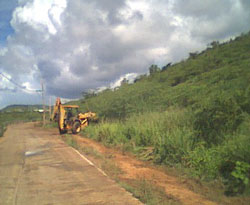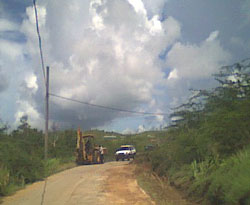

The Costa Bonita project was cited by the DNER for a land clearing violation. (Not the first time.)
The bull dozer was stopped less than 15 minutes after the problem was reported to U.S. Fish and Wildlife Service personnel, and the DNER Vigilantes, on this long Festival weekend.
Both local and federal government agencies have documented problems with the Costa Bonita time-share project. Dr. Ariel Lugo, Director of Tropical Forestry, U.S. Forestry Service, U. S. Department of Agriculture, documented serious environmental impacts to salt flats and wetlands from illegal land clearing at the Costa Bonita project site and access roads.
Members of the Southeast Harbor Homeowners Association supporting the water pipeline in partnership with these developers, should be made aware of Costa Bonita´s poor environmental track record, well documented by government agencies.
While fresh and plentiful potable water for Culebra sounds great to all of us, we need to be realists about our fresh water resources.
If it sounds too good to be true, it probably is.
In documents we have reviewed, the Puerto Rico Aqueducts and Sewers Authority's (PRASA) commitment to providing water for Culebra has always been to justify growth. Today's accelerated development is causing irreparable impact to Culebra's valuable natural resources.
We would like to review the data that supports PRASA's statement that there exists a source of potable water to justify the hook-ups associated with the extended pipeline, and to support growth to three times the current density of Culebra.
To date PRASA has failed to demonstrate that it can consistently provide safe water for Culebra´s current population, even during times of heavy rainfall.
Development on Culebra requires that a source of potable water and waste water treatment be demonstrated in order to be approved by the Planning Board. In 1996 when the U.S. Army Corps of Engineers issued the permits for the pipeline from Vieques, land clearing for development on Culebra escalated dramatically, well before the pipe had been constructed. The point being, all development seems to need is a "demonstration" of infrastructure at the planning level, and not necessarily actual infrastructure in place. The big island of Puerto Rico is suffering critical environmental impacts from development without infrastructure.
US Army Corps of Engineers issued a "Notice of Noncompliance," April 28,1999, citing 8 serious construction violations of PRASA's Army Corp's permit on the construction of the water pipeline connecting Culebra to Vieques. One major infraction cited was PRASA's failure to bury the tube, that now precariously balances on cement sacks of concrete and is, according to Army Corps, "vulnerable to the elements, increasing the possibility of a potential breakage."
The Federal Emergency Management Authority (FEMA) committed to PRASA $900,000 for repairs and storm-proofing Culebra's desalinization plant, the island´s other major source of potable water. This is contingent upon $300,000 additional dollars from the government of Puerto Rico and PRASA demonstrating substantial progress toward the repairs by February 28, 2002. Therefore, the future of the desalinization plant could be as tenuous as that of the pipeline.
To date, neither PRASA nor anyone else has produced any documents backing up the claim that there exist sources of potable water to justify the additional hook-ups and to increase the density of Culebra to three times the current population. Neither capacity nor environmental impact studies have been produced to justify the Costa Bonita or SE Homeowner hook-up. The agency has failed to solicit meaningful public participation regarding the extension of the water pipeline. The documents we have seen from PRASA, indicate consistently an agenda to support growth.
The illegal land clearing started last Saturday morning was the only indication we have had to date that the pipeline project is still alive.
To date, 10 members of the Southeast Harbor Homeowners Association have expressed opposition to the extension of the pipeline. Included in the 10 are the only 2 full-time-resident members of the Association, one being the acting Association President.
Support documents are available upon request from our office, with more information to be posted on website by the end of September.